Disclosure: This article contains affiliate links. We may earn a commission from purchases at no extra cost to you, which helps our travel content.
There's something profoundly humbling about watching a child's face illuminate with wonder as they spot their first giraffe in the wild or gaze up at the Kalahari's impossibly starry sky. Though I typically travel solo, last month I had the joy of hosting my sister and her two children (ages 7 and 9) for a week of safari adventures based out of Gaborone. What unfolded was a perfect alchemy of luxury comfort, scientific discovery, and cultural immersion that proved the Kalahari isn't just for hardcore safari enthusiasts—it's an open-air classroom where family bonds strengthen under African skies.
Gaborone: The Unexpected Family-Friendly Base Camp
Most travelers rush through Gaborone, viewing it merely as a transit point to more famous safari destinations. This oversight is their loss. The city offers a gentle introduction to Botswana that's perfect for families adjusting to the rhythm of Africa.
We settled at the Lansmore Masa Square Hotel, where the kids immediately claimed the infinity pool as their territory while I appreciated the panoramic city views from our adjoining rooms. The staff greeted my niece and nephew with special welcome packs containing wildlife identification cards—a thoughtful touch that kickstarted their safari excitement.
Gaborone's National Museum provided an excellent primer on Botswana's cultural and natural history, with interactive exhibits that kept the kids engaged. My nephew, already a budding geologist at age 9, was captivated by the mineral collection, while my niece practiced traditional basket weaving techniques with surprising dexterity.
For families, I recommend spending at least two days in Gaborone before heading into the wilderness. This adjustment period allows children to acclimate to the new environment while still enjoying modern comforts. The city's restaurants cater well to picky eaters—Caravela Portuguese Restaurant became our go-to for its child-friendly menu and adults-approved wine list.
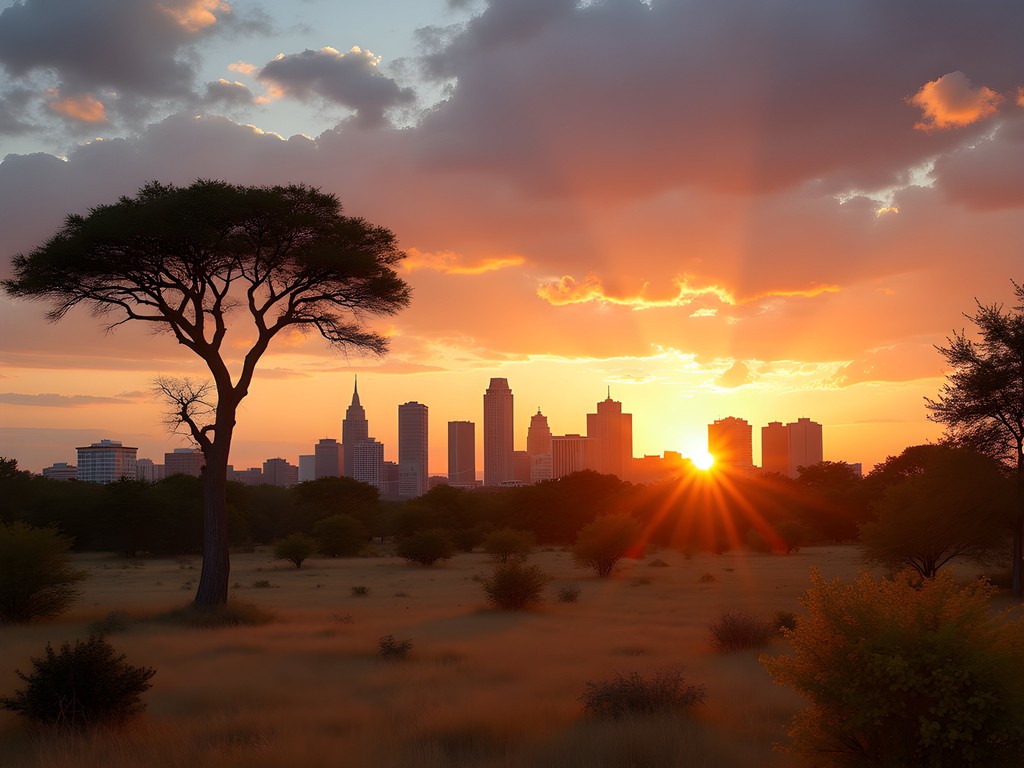
💡 Pro Tips
- Book accommodations with adjoining rooms or family suites for privacy and togetherness
- Visit the National Museum early in your trip to provide context for what children will see on safari
- Pack a small polaroid camera for kids to document their own safari memories
Mokolodi Nature Reserve: Wildlife Encounters for All Ages
Just 15 kilometers south of Gaborone lies Mokolodi Nature Reserve—a perfect first safari experience for children. Unlike the more remote reserves that require long drives and extreme patience, Mokolodi delivers reliable wildlife sightings within a manageable 30-square-kilometer area.
We opted for a morning game drive specifically designed for families. Our guide, Mpho, possessed that magical ability to translate complex ecological concepts into stories that captivated both adults and children. When my nephew asked why warthogs kneel while eating, Mpho explained their poor neck flexibility with such animated gestures that the kids still imitate his 'warthog dance' weeks later.
The reserve's rhino tracking experience proved to be the highlight. Before setting out, each child received a safari vest with pockets for their wildlife checklist and compact field guide. Walking quietly through the bush, following fresh rhino tracks, created a sense of adventure that no zoo could replicate. When we finally spotted two white rhinos grazing peacefully, the collective intake of breath from our small group said everything about the power of these encounters.
For lunch, the reserve's restaurant served farm-to-table meals with ingredients from their organic garden. My niece, normally hesitant with new foods, surprised us by requesting seconds of the pumpkin soup—a small victory in expanding young palates through travel.
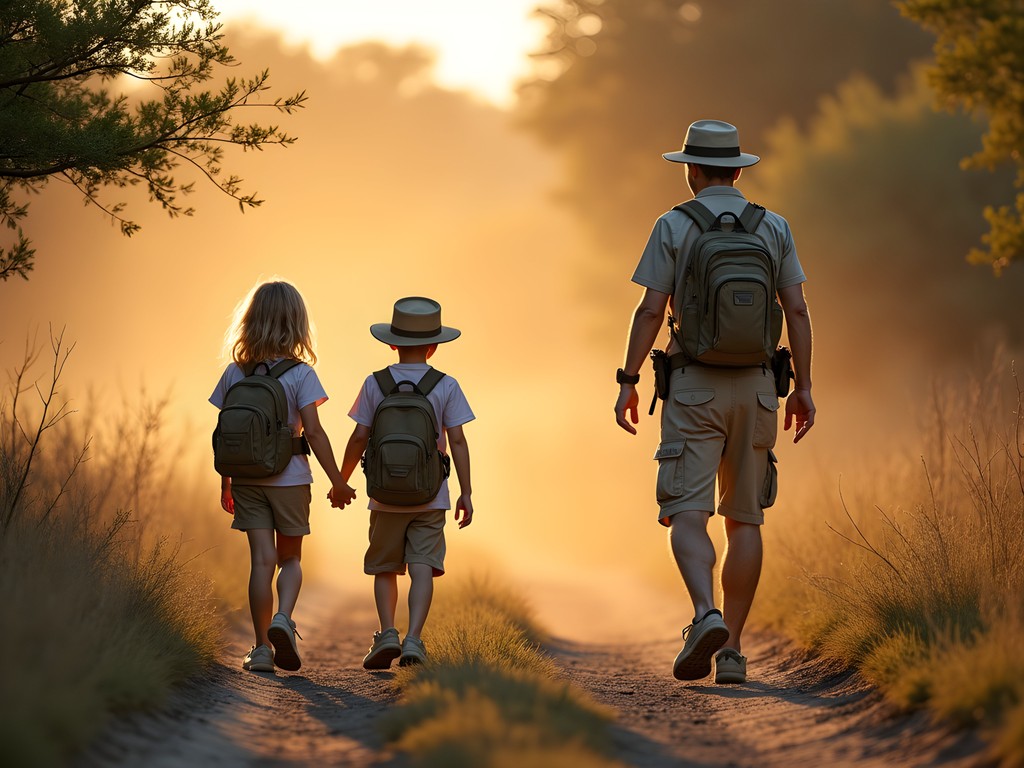
💡 Pro Tips
- Book the family game drive specifically, as guides adapt their approach for children's attention spans
- Bring binoculars for kids that are durable enough to survive being dropped
- Visit the Mokolodi reptile park early in the day when snakes are most active for demonstrations
Kalahari Desert: Luxury Camping with Scientific Wonder
For our Kalahari adventure, we chose a three-day excursion with Ker & Downey Botswana to their family-friendly camp in the Central Kalahari Game Reserve. The journey itself became part of the experience, with our guide pointing out changes in vegetation and geology as we traveled farther from Gaborone.
Our luxury tented camp struck the perfect balance between comfort and immersion in nature. The kids were delighted to discover their tent came equipped with solar-powered headlamps for nighttime adventures and wildlife identification cards for tracking their sightings.
Morning game drives revealed the desert's surprising biodiversity. We tracked a pride of the legendary black-maned Kalahari lions, observed meerkats teaching their pups survival skills, and marveled at oryx standing majestically against red sand dunes. The guides expertly balanced wildlife viewing with hands-on learning—teaching the children to identify animal tracks, explaining how plants adapt to desert conditions, and demonstrating traditional hunting techniques.
As a diving enthusiast accustomed to exploring marine ecosystems, I found fascinating parallels in how desert organisms have evolved specialized adaptations for survival. My nephew was particularly fascinated by the sociable weavers' massive communal nests, prompting discussions about cooperation in nature that continued throughout our journey.
Each evening, the camp staff set up portable telescopes for stargazing. Away from light pollution, the Kalahari night sky reveals itself as one of Earth's greatest spectacles. Our guide pointed out constellations from both Western astronomy and indigenous Batswana traditions, weaving science and cultural storytelling together in a way that kept the children engaged well past their normal bedtime.
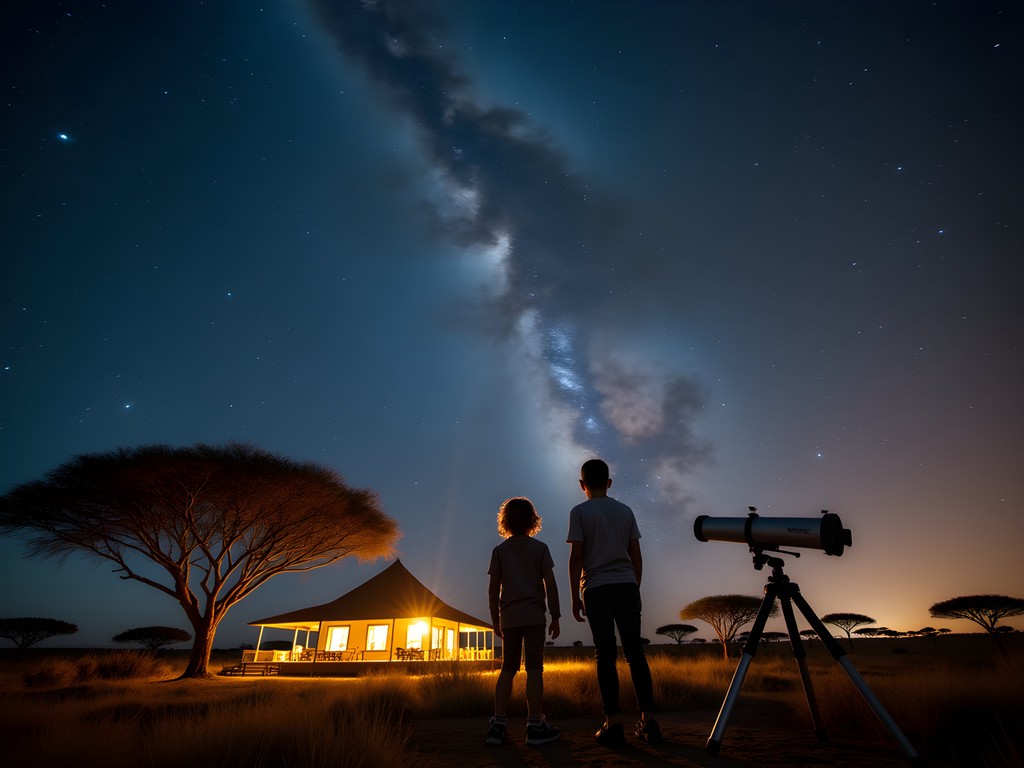
💡 Pro Tips
- Pack cooling neck wraps for daytime heat, especially when traveling with children
- Bring a quality star chart app that works offline for enhanced stargazing experiences
- Request family tents with adjoining sections for peace of mind while maintaining privacy
Cultural Immersion: Meeting the San People
One of my priorities when traveling with children is creating opportunities for authentic cultural exchange. Through our lodge, we arranged a respectful visit with a San community living traditionally on the edge of the Kalahari.
Before our visit, I prepared the children by explaining the San people's profound connection to the land and their status as one of the world's oldest cultures. We discussed appropriate behavior and brought educational gifts rather than candy or money.
The morning spent with the San community transformed my niece and nephew's understanding of what it means to be 'rich.' They were initially confused by the absence of technology but soon became engrossed in learning survival skills. A San elder demonstrated fire-making techniques using only sticks and dried grass, a process my nephew later described as 'better than any YouTube video.'
The children participated in a traditional foraging walk, where they learned to identify edible plants and track small game. My niece, normally hesitant around insects, found herself fascinated by the San children's explanation of which beetles were helpful and which to avoid.
Perhaps most valuable was watching the children communicate despite language barriers. By afternoon, they were playing traditional San games together, proving that play truly is a universal language. This experience prompted deeper conversations about different ways of living and the importance of preserving indigenous knowledge—conversations that continued long after we returned to Gaborone.
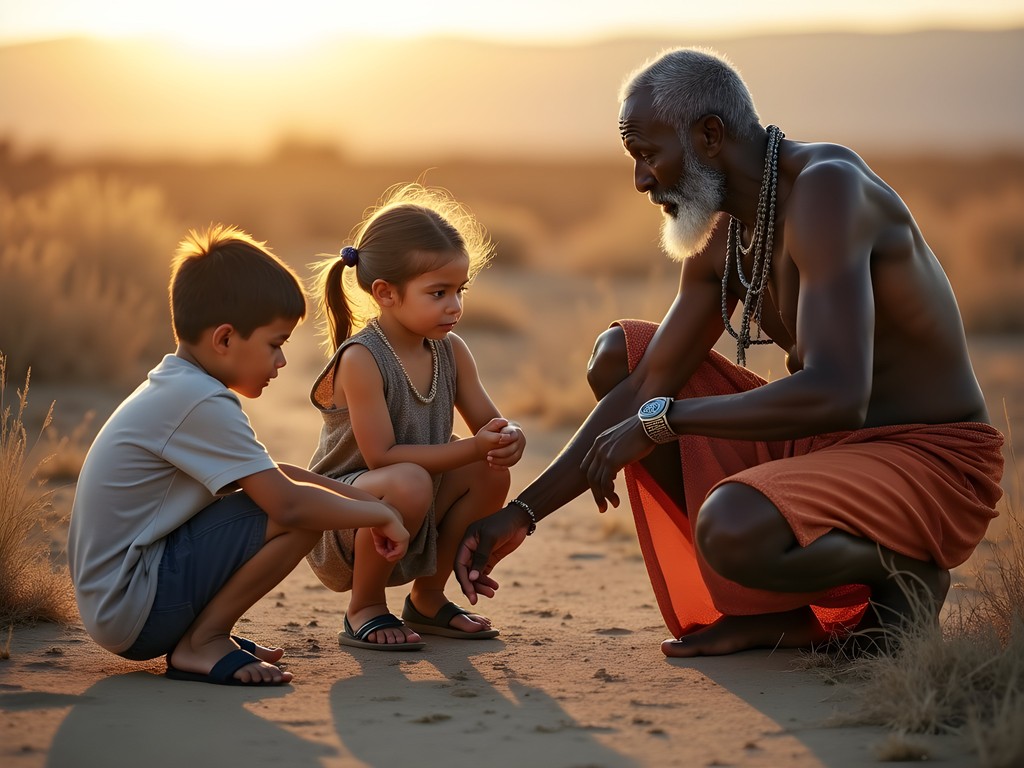
💡 Pro Tips
- Research cultural protocols before visiting indigenous communities and discuss appropriate behavior with children beforehand
- Bring meaningful gifts that support education or community needs rather than creating dependency
- Allow plenty of unstructured time for children to interact naturally with local kids
Mindful Safari: Teaching Children Conservation Through Experience
As someone who pivoted from tech burnout to mindfulness-centered travel, I was keen to incorporate contemplative practices into our family safari. While 'meditation' might seem incompatible with energetic children, I discovered that the Kalahari naturally induces a state of mindful awareness.
Each morning, we began with a simple 'safari gratitude' ritual. Before leaving our tents, everyone shared something they hoped to see and something they were already grateful for. This simple practice helped frame each day as a gift rather than a checklist of animals to spot.
Our guide embraced this approach, incorporating 'silent game drives' where we would stop the vehicle for five minutes of complete quiet, listening to the subtle sounds of the bush. Initially fidgety, by the third day, the children were reminding adults when it was time for our silent observation.
To enhance these experiences, I brought along a nature journal for each child. Rather than simply photographing animals, they sketched what they saw, recorded sounds they heard, and noted questions to research later. This slowed-down observation created deeper connections with wildlife than any number of hasty photos could achieve.
We also participated in the lodge's junior conservation program, where the children learned about poaching threats and conservation solutions. They helped staff check camera traps and input data about wildlife sightings, experiencing science as an adventure rather than a school subject.
The culmination was a 'conservation pledge' ceremony where each child received a wildlife adoption kit for an endangered Kalahari species. My nephew chose the pangolin, while my niece selected the African wild dog—commitments they continue to honor through learning and sharing with friends back home.
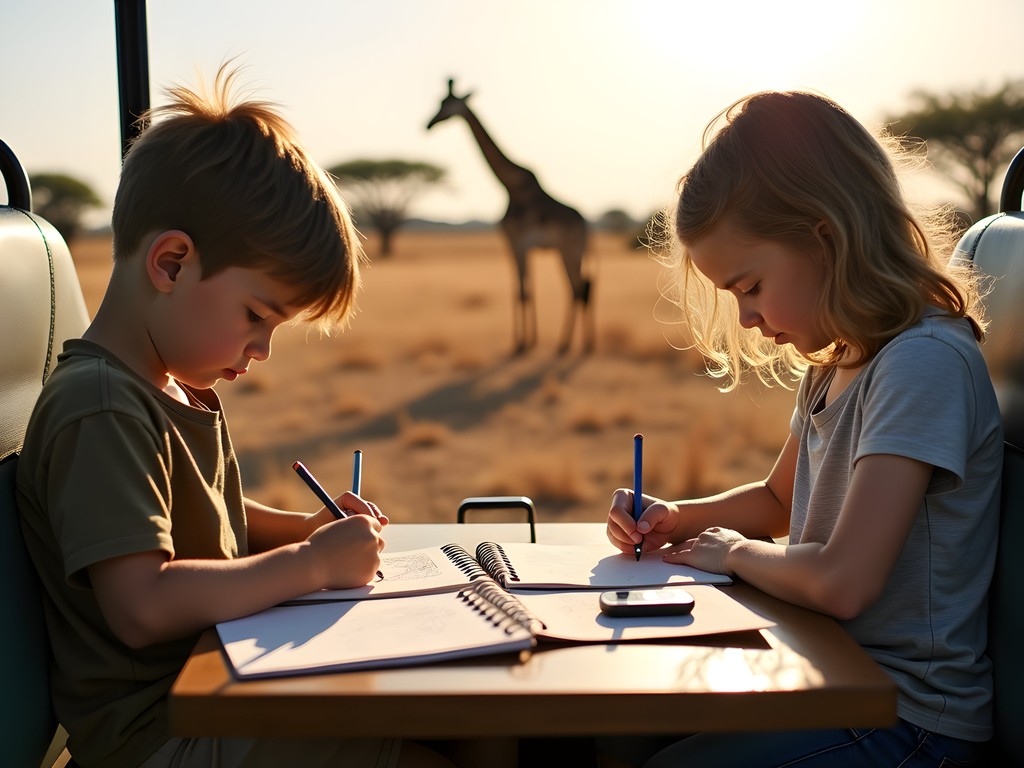
💡 Pro Tips
- Create simple mindfulness rituals that children can understand and embrace
- Allow time for drawing and journaling rather than just photography
- Research lodges with specific junior conservation programs before booking
Final Thoughts
As our week drew to a close, I watched my niece and nephew pack their treasures—journals filled with wildlife sketches, San crafts carefully wrapped in tissue paper, and memory cards bursting with photographs. But their most valuable souvenirs weren't physical. They were returning home with expanded worldviews, newfound respect for different ways of living, and the quiet confidence that comes from navigating new experiences.
The Kalahari, when approached through Gaborone's family-friendly gateway, offers that rare destination that satisfies both adult desires for luxury and authentic experiences while captivating children's imaginations. The key is balance—alternating wildlife adventures with cultural encounters, educational moments with pure play, and digital detox with strategic technology use for learning.
As we watched our final Kalahari sunset, my nephew asked when we could return to see how 'his' pangolins were doing. In that moment, I recognized the true power of mindful family travel: creating the next generation of conservation advocates through direct experience rather than abstract education. The Kalahari had worked its magic, turning city kids into budding naturalists and transforming what could have been a simple vacation into a foundation for lifelong environmental stewardship.
✨ Key Takeaways
- Gaborone provides an ideal family-friendly base for acclimating before venturing into the Kalahari wilderness
- Specialized family safari experiences balance education with adventure in ways that captivate children
- Cultural exchanges with indigenous communities create profound learning opportunities when approached respectfully
- Incorporating mindfulness practices helps children develop deeper connections with wildlife and ecosystems
📋 Practical Information
Best Time to Visit
April-May and September-October (shoulder seasons with moderate temperatures and good wildlife viewing)
Budget Estimate
$5,000-$8,000 for a family of four for one week (including luxury accommodations, guided safaris, and domestic transportation)
Recommended Duration
7-10 days (2 days in Gaborone, 5-8 days on safari)
Difficulty Level
Moderate (Suitable For Children 6+ With Some Preparation)

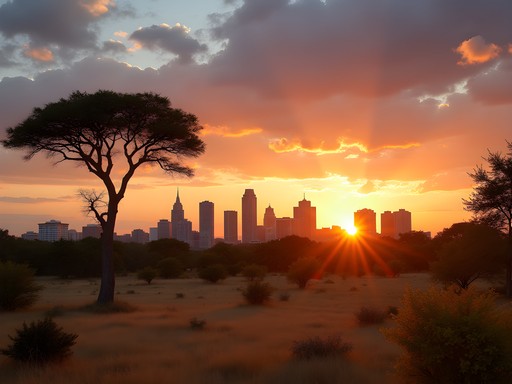
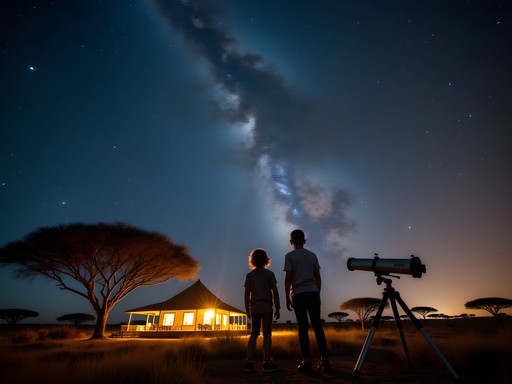
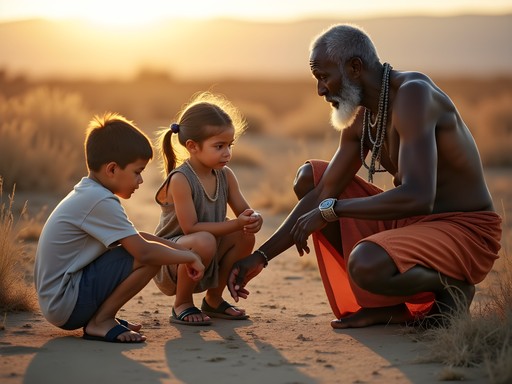
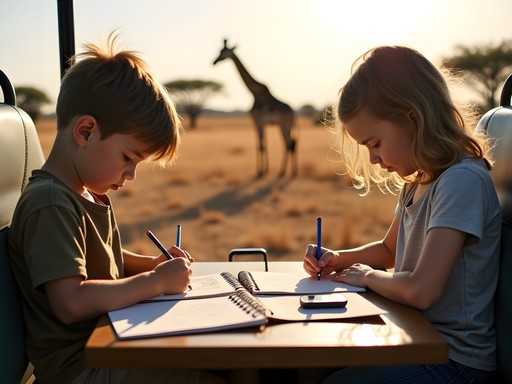


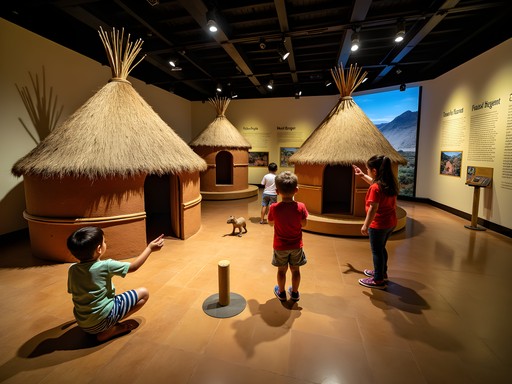
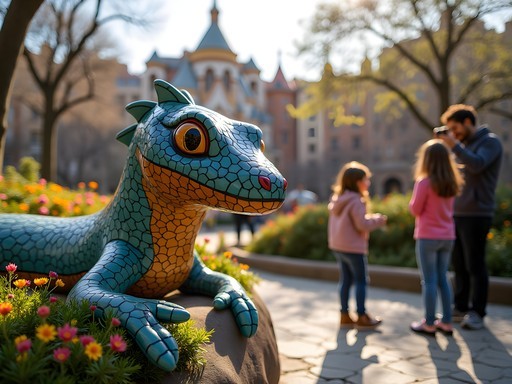

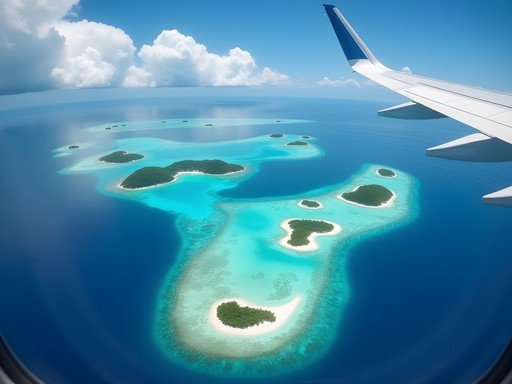
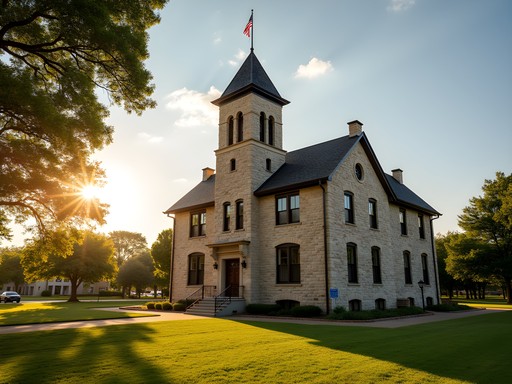
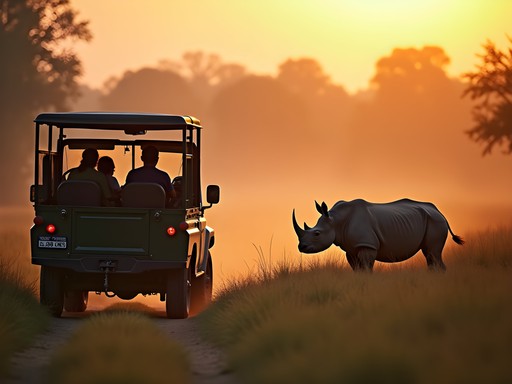
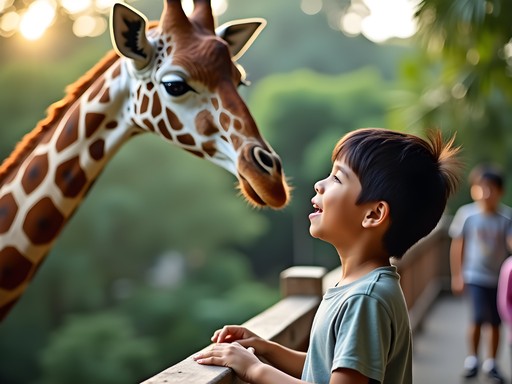

Comments
sunsetlife
We did a similar trip last year but struggled with keeping the kids entertained during the longer drives. Your idea of wildlife spotting journals is brilliant! Wish I'd thought of that. The stargazing experience sounds magical too - our kids still talk about seeing the Milky Way so clearly for the first time. Did you find the luxury camps were truly kid-friendly or just tolerating them?
nomadmaster
Not the author but we just got back from a similar trip! The camps near Gaborone were actually super kid-friendly. Our guide at Mokolodi had special activities just for the little ones while we did some more advanced tracking with our teenagers.
sunsetlife
That's great to hear! Might try Mokolodi next time. Our kids are a bit older now (9 and 11) so might appreciate it more.
blueseeker
Great post! How hot was it during your trip? Thinking of taking my 6-year-old next spring but worried about the heat. Also, did you need any special gear for the kids?
Abigail Kelly
It was warm during the day (around 85°F/29°C) but cooled down significantly at night. I'd recommend kids binoculars - my niece and nephew fought over mine the whole trip! Also pack plenty of sun protection and lightweight long sleeves for evenings when mosquitoes come out.
blueseeker
Thanks for the tips! Will definitely get those binoculars. Were the lodges you stayed at good with providing kid-friendly meals?
Abigail Kelly
The lodges were fantastic with kids' meals! They even did special bush dinners where the kids could help prepare simple dishes with local ingredients. Just let them know dietary restrictions in advance.
Jean Wells
Fascinating piece, Abigail. I visited the Kalahari last year (solo, of course) and found the experience quite different without children's perspectives. Your observations about using Gaborone as a base are spot-on - the infrastructure there makes the logistics much more manageable than most realize. I particularly appreciated your notes on the educational aspects at Mokolodi. My analysis suggests that wildlife reserves striking this balance between conservation education and accessibility are statistically more successful in their preservation efforts. Did you find the guides modified their approach significantly for the children?
Abigail Kelly
Jean, you're absolutely right about the conservation education correlation. The guides at Mokolodi were exceptional - they carried special kid-friendly field guides and had the children participate in a 'junior ranger' tracking activity that was both fun and educational. Very different from my previous adult-only safaris!
summernomad
Those stars in the Kalahari look amazing! Added to bucket list!
nomadmaster
This is exactly what I needed! Planning a trip with my sister's kids (7 and 9) and was worried the Kalahari would be too intense. Love how you balanced luxury with authentic experiences. Did the San people interaction feel respectful? Sometimes cultural tourism can be iffy.
Abigail Kelly
Thanks @nomadmaster! The San cultural experience was actually arranged through a community-led program. They control the narrative and the money goes directly to their community. The kids were fascinated by the tracking skills demonstration!
nomadmaster
That's so good to hear! Booking it now. Thanks for the quick response!
islandguide
Just remembered something that saved our trip - download wildlife checklist apps before you go! Our kids turned spotting animals into a game and it kept them engaged during longer drives. Also, the Gaborone restaurants are surprisingly kid-friendly. The Courtyard Restaurant has an amazing play area where kids can burn energy while parents enjoy a meal!
adventureblogger
How was the temperature for kids in the Kalahari? Planning for December with my 6yo and worried about heat.
Abigail Kelly
December is summer there, so it will be hot! Most activities happen early morning/late afternoon to avoid midday heat. The camps have pools which the kids loved for midday breaks. Pack light breathable clothes, wide-brimmed hats, and tons of sunscreen. The luxury tents have cooling systems too!
escapevibes
That shot of the kids silhouetted against the sunset is absolutely magical! What camera did you use? Also, did you find the luxury camps accommodating with special meals for picky eaters?
Abigail Kelly
Thank you! Just my iPhone 15 Pro for that shot - the light did all the work! And yes, the camps were amazing with food. They prepared special kid-friendly meals but also encouraged trying local dishes. My nephew surprised us by loving the traditional seswaa (pounded beef)!
smartgal
Love how you made this educational for the kids too! Those journals sound like perfect souvenirs.
Bryce Diaz
I'm usually a solo traveler, but I happened to be in Gaborone during a family reunion last year and took my nieces (ages 8 and 10) to many of these same places. The San experience was transformative for them! One thing I'd add - the Gaborone Game Reserve right in the city is perfect for that first wildlife exposure before heading deeper into the Kalahari. It's small but has giraffes, zebras, and various antelopes that get kids excited without overwhelming them. Also, the Botswana Craft market in Gaborone has kid-friendly workshops on weekends where they can make traditional crafts. My nieces still have their beaded bracelets!
Abigail Kelly
Great addition about the city game reserve, Bryce! I completely agree it's perfect for easing kids into wildlife viewing. We actually did stop at Botswana Craft but missed the weekend workshops - sounds like we'll need to time our next visit better!
Venture X
Premium card with 2X miles, $300 travel credit, Priority Pass